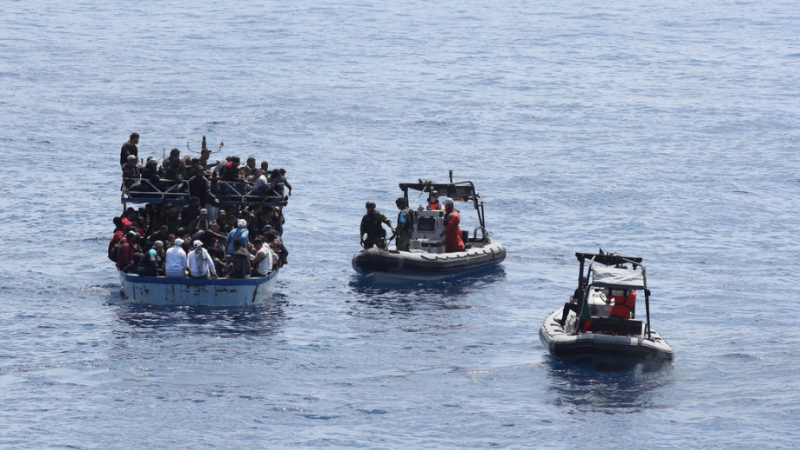The European Union’s border agency Frontex has shared the location of migrant boats with the Libyan coastguard more than 2,000 times in three years, in a far wider collaboration than previously known.
A letter from Frontex’s new boss, Hans Leijtens, to the European Parliament, leaked to the German newspaper Der Spiegel and Lighthouse Reports, reveals that since January 2021 alone, Frontex has sent “around 2,200 emails” with the position data of migrant boats in distress to the Libyan rescue centre.
This took place despite the well-documented violent behaviour of the coastguard and the torture and inhumane treatment the migrants face on their return to Libya.
Frontex routinely transmits the coordinates of refugee boats to all relevant sea rescue control centres in the region, including the Libyan one in Tripoli. This, in turn, alerts the Libyan coastguard – and sometimes, it seems, a notorious militia of warlord Khalifa Haftar, who controls the east of the country.
Asked by the media about the extent of the cooperation, Frontex replied: “The decision to share information on vessels in distress with the Libyan Rescue Coordination Centre, alongside other national centres, is taken with a heavy heart, underpinned by the principle that every possible avenue must be explored to save lives”.
The investigation by Der Spiegel and Lighthouse Reports also reveals that Jonas Grimhegen, Frontex’s human rights officer, has warned of the potential legal ramifications, stressing that by providing coordinates to Tripoli, Frontex may be indirectly facilitating the return of migrants to unsafe conditions.
Grimheden is reported to have criticised the cooperation with the Libyans by writing that “de facto” it was only Frontex’s position data that allowed the Libyan authorities to “track down the migrant boats and return them to Libya”.
According to the report, Frontex’s own human rights officer believes the agency may be complicit in the Libyans’ ongoing violation of international law. Citing relevant case law, he explicitly warns of possible “legal consequences” for EU states and the agency. Grimheden writes of “high reputational risks”.
Letter leaked to @LHReports & @Spiegel reveals Frontex gave away the location of migrant boats to Libya's coastguard more than 2000 times in 3yrs, while watching them whip, beat & shoot at people fleeing Libyahttps://t.co/tLh22nHKfy
— Lighthouse Reports (@LHreports) February 11, 2024
Grimheden advocates for significant reforms within Frontex, recommending that the agency should only share coordinates with Tripoli under certain conditions.
These conditions include collaborating with UNHCR and IOM to prevent migrants from being returned to brutal detention camps upon reaching the Libyan coast. Frontex must also encourage EU states to engage in more rescue operations in the Libyan rescue zone and alert Libyan authorities against the use of violence.
Most notably, Grimheden suggests extending the sharing of refugee boat positions in the Libyan rescue zone to private sea rescuers, marking a potentially groundbreaking change in rescue operations.
This is far from the first time that Frontex has been accused of being complicit in human rights abuses. In 2022, a classified internal audit of Frontex by the EU’s anti-fraud agency OLAF alleged a cover-up of illegal pushbacks of asylum seekers from Greece’s and Malta’s search and rescue zone to Libya.
The same year, a drone registered and operated out of Malta by a private company on behalf of the European Union’s border control agency Frontex has been implicated in human rights abuses, according to an in-depth multimedia analysis published by Human Rights Watch.
The drone, as well as five aeroplanes being run out of Malta and, to a far lesser extent, Sicily, were found to be relaying information on migrant boats leaving Libya to the Libyan authorities.
Last year, the report ‘No One Came to Our Rescue: The Human Costs of European Migration Policies in the Central Mediterranean’, by the NGO Medicins Sans Frontiers (MSF), found that European Union member states are increasingly backing away from their duty to rescue people at sea, underlining a grim picture of a neglected humanitarian space where the number of shipwrecks is multiplying.
MSF also describes how, in August 2023, a Frontex drone circled over a boat in distress for 30 minutes. Despite this, the EU border agency did not share information about the boat with MSF, so MSF’s rescue ship, the Geo Barents, had to carry out the rescue.
An hour after the rescue, a Libyan coastguard vessel provided by Italy approached the Geo Barents and issued verbal threats, insisting that it leave the area immediately.
The Maltese authorities have also been implicated in several pushbacks, with a United Nations mission last April confirming that many people have been sent back to Libya to face horrific treatment in detention centres, including sexual violence, torture and forced sexual practices in exchange for water, food and other necessities.
It is also well documented that the Maltese RCC regularly refuses to assist people on board migrant vessels, even when those on board are facing life-threatening conditions.













This is a real shame sending them back to be dealt with in a cruel manner, with torture, imprisonment or killed. Where has humanity gone?